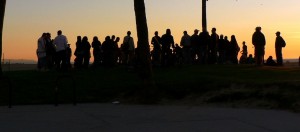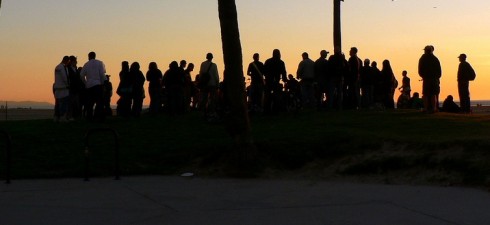 Over a decade ago I read this article in Mothering Magazine about a woman who is far from family and friends and meets up with another woman to share household projects and childcare over the course of a day several times a week, alternating households. I immediately knew I wanted to Find My Tribe. I was a young, stay at home mom with two little children and we’d gone through the typical several moves as my husband got established in his career. Like many, there were days I felt quite isolated and as if I lacked focus. Childrearing came fairly naturally to me and I devoted myself to it, but even I couldn’t make my kids take up all 24 hours in a day every day.
Over a decade ago I read this article in Mothering Magazine about a woman who is far from family and friends and meets up with another woman to share household projects and childcare over the course of a day several times a week, alternating households. I immediately knew I wanted to Find My Tribe. I was a young, stay at home mom with two little children and we’d gone through the typical several moves as my husband got established in his career. Like many, there were days I felt quite isolated and as if I lacked focus. Childrearing came fairly naturally to me and I devoted myself to it, but even I couldn’t make my kids take up all 24 hours in a day every day.
I’ve always been a social being, and it wasn’t that I felt unconnected; on the contrary, I had several groups to which I felt I belonged. Church was always a ‘built in’ social network, so there was that; I was a volunteer La Leche League Leader, so I had co-Leaders and other mothers in the group with which to work with and get to know. Of course there are always neighbors and as the kids have gotten older, classmate’s families. But my life felt fragmented, as if I was all these different characters: church member, neighbor, PTA mom, LLL Leader, ‘work friend.’ As time went by, I often felt as if I was playing circumscribed roles- don’t talk school issues with LLL people, don’t talk parenting issues at church, don’t talk church issues with neighbors, don’t talk feminism or politics with church people, etc. It was almost the opposite of what I hear my friends from Utah complain about-that church permeates all aspect of life. Instead, I felt like my life was fragmented into several large slices that didn’t intersect, as if I was the only place the Venn diagram overlapped.
I had discovered list-serves and online bulletin boards a few years before I read the Mothering article. I got on a list of La Leche League Leaders and it seemed quite novel to have hundreds of us in communication with each other. It splintered, as these groups do, and I eventually found myself administering a list of other LDS La Leche League leaders (there aren’t too many of us!). But the limits of geography and the lack of ‘face time’ limited the connections we were able to make. And I still felt as if I was playing a prescribed role- a more defined or limited one, in fact.
An acquaintance of mine began investigating a co-housing community in our area and purchased a home there in search of a Tribe for her family. I observed as they attempted to integrate and followed their successes and failures. At the time, it seemed like a radical move to me. Sell your HOUSE? Just to have nice neighbors? I didn’t get it. Another woman I worked with in my 20s lived with her parents by choice. They combined households and it felt very awkward to me- who would want to give up that kind of independence? Wasn’t it a measure of success to buy a house, have two cars, do your own grocery shopping?
I now work exclusively with new parents as a lactation consultant, and I regularly come face to face with the consequences of modern society’s move away from living in family groups. At least half the women I counsel are living far from family and often even friends. If their families do live close by, it is rare that there is regular contact and support for a new mother- everyone who is lucky enough to have a job is working hard, and each generation is maintaining their own household. There are no economies of scale. Grandma is often around for a few weeks, dad goes back to work right away, and then a new mother is left to muscle through on her own, whether indefinitely or until her maternity leave is over. Without support, being back at work can even be more disorienting. I always try to connect mothers to peer support, but frankly there isn’t anything organized for fathers and many women don’t feel comfortable stepping out into a new social group at a vulnerable time.
Over the past few years, through a series of coincidences and introductions by friends-of-friends, I’ve experienced a few moments of true communion and conviviality. And it didn’t happen by finding a group of 38 Year Old Blue-Eyed Liberal Mormon Lactation Consultants. In fact, I’ve often felt it with people with whom I really only shared one circle in my Venn diagram. But I have started to see the draw of communal living that appealed to many of the early Saints and to my modern-day friends. These moments have fed my soul, even if they are far from the workaday Tribe I imagined for myself when I first read the article. I wonder if I was trying too hard?
Have you found Your Tribe? This article takes an approach that might resonate with Mormons by providing “Twelve Tips. ” Share your own tips in the comments!

I like the Venn diagram analogy. I feel like that a lot. On occasion I’ve planned a backpacking trip and then “put it out there” for any of my friends to join. Sometimes that makes a strange group. Last fall, four of us went out for three days and I was the only common factor between the other three men — they knew me, but didn’t know each other until I picked them up at their homes.
As to the crux of the matter, no, I don’t think I’ve found my tribe. I feel more and more uncomfortable at church, but my wife would never think of leaving the church because it is her life and everything she is.
A related thing that I see over and over is that couples we thought we were really good friends with (kids the same ages, same ward at church, etc.) moved out of the ward and we never (or hardly ever) saw them again. Or, maybe we tried really hard for a year or two, but then went a year without seeing or talking to them. That always makes me sad.
In a way, the people at church (LDS in this case) become your friends because church becomes your life. You spend so much time there that you almost don’t have a chance to socialize anywhere else.
I am, however, grateful that my now divorced sister lives in the same house as my mother. Over the past 6 months my mother’s health has really taken a turn for the worse and if my sister didn’t live with her, my mother would be forced to move into one of our homes and give up her “own” home. A friend of mine recently said that he’s going to die all alone because his kids don’t care enough about him to take care of him in his old age. I guess that is why that, in this economy when almost all building construction has halted, the only thing being built around here are nursing homes and assisted living facilities. I guess we are just too busy to take care of our young (day care) or our old (assisted living).
Sorry. I feel like that’s a downer. At least I feel way more sad now than when I started writing this…
Interesting thoughts.
I got the life fragmentation thing going real bad. Law firm crowd, client crowds, Emory museum crowd, Emory law school crowd, Emory film dept crowd, church crowd, neighborhood crowd, online crowds (I can’t remember how many FB secret groups I’m a member of anymore), kid’s sports/activities crowds.
When I read the title to this piece I heard it sung in my mind to the tune of “Find Your Grail” in Spamalot.
Fascinating way of looking at modern sociality.
I’ve actually been wanting to create my own communal type of living arrangement for years now. We really want to find enough land to not only have animals and an orchard and garden, but to share with some of my family. My dream would be to have my mom and her husband and my grandmother and some of my siblings living with us (with everyone having a separate house but a communal living space of some sort) I think my children would benefit so much from having more family around, especially my grandmother who a wiz at natural living. We’re actually getting to the point where we are working toward making this a potential reality. We may start out on our own, but we really want to have enough room for family to join us if they want. We’re all so spread out, and I really feel the loss of that connection that just hasn’t been found in friends up to this point.
Although, we almost bought land with some like-minded friends and talked about doing something very similar together. I think the idea of homesteading and living not only closer to the earth, but closer to other people (not just as neighbors in suburbia) in how we rely on each other is becoming more appealing to more people.
There are true communal-living communities out there, where several families share a kitchen space, etc. It’s a fairly radical idea, but also makes sense in a lot of ways. It’s so far apart from the way our society is set up. I know I haven’t found my tribe, and I used to mourn that more than I do now; I seem to be more comfortable with the peace of my current life. It’s an interesting thing to ponder, and important.